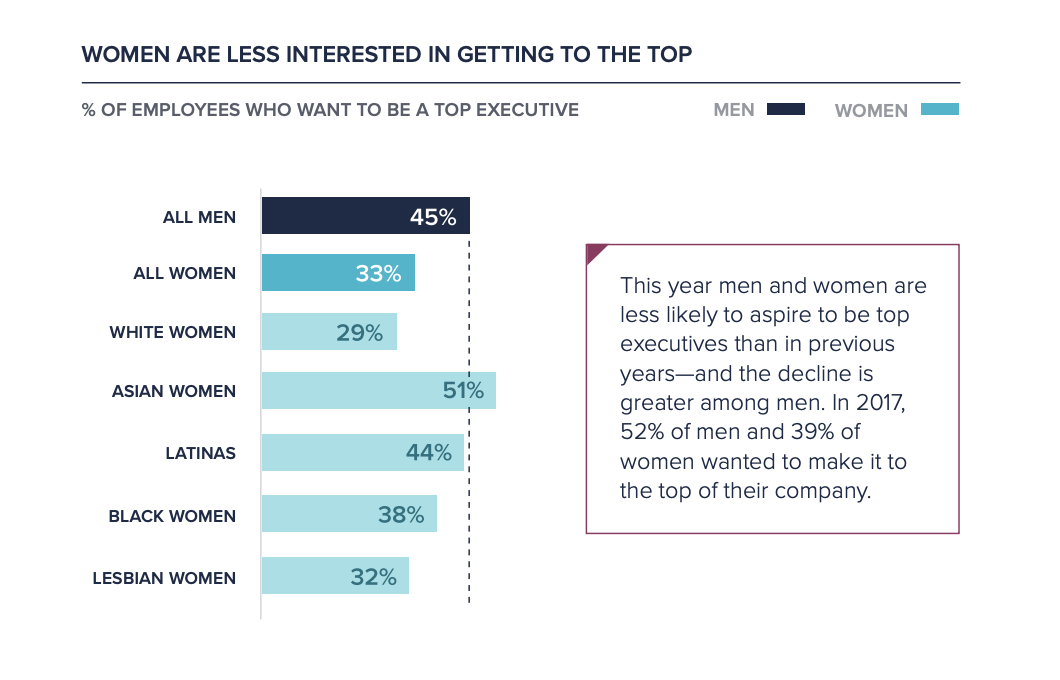Every year for the last five years, McKinsey & Company partners with LeanIn.org to publish their Women in the Workplace study. It is the "largest comprehensive study of the state of women in corporate America,” and its goal is to "give companies and employees the information they need to advance women and improve gender diversity within their organizations."
I love this report because, I believe, it provides crucial stress points that lead directly and indirectly upstream to our girls. Can we help girls prepare for biases women are experiencing in the work world? Are there roadblocks women are putting in their own way that we can be on the lookout for starting in middle and high school?
However, something very different appeared in the last two reports. And many things stayed EXACTLY. THE. SAME.
Here is what the reports say has stayed the same: Although companies have reported they are highly committed to gender diversity, that commitment has not translated into tremendous progress. There is a slight improvement in senior leadership and C-suites but “women continue to be underrepresented at every level.” Women are doing their part. They've been earning more bachelor's degrees than men for decades, and they're asking for promotions and negotiating salaries at the same rates as men. And “contrary to conventional wisdom, they are staying in the workforce at the same rate as men."
This year’s study pinpoints a key breakpoint they call the ‘broken rung.’ “The biggest obstacle women face on the path to senior leadership is at the first step up to manager. For every 100 men promoted and hired to manager, only 72 women are promoted and hired. This early inequality has a long-term impact on the talent pipeline. Since men significantly outnumber women at the manager level, there are significantly fewer women to hire or promote to senior managers. The number of women decreases at every subsequent level. So even as hiring and promotion rates improve for women at senior levels, women as a whole can never catch up. There are simply too few women to advance.
Interestingly, again in last year’s report, by a wide margin, women are much less likely to want to get to the top of the corporate ladder, and this has always bothered me. To be clear, women want to advance as much as men and are asking for promotions as often as men. However, women's desire to get to the C-suites (CEO, COO, CFO, etc.), the executive level, the tippy top of Corporate America, is staggeringly low.
I always wondered what caused this. Could this lack of desire be due to the stalled progress women feel at this “broken rung?” Why shoot for the top office when your chance of success is slim to none? There is plenty of research to support the line of thought that women become demoralized since young girls, by and large, like to lead and see themselves as leaders.
Or, are women less comfortable with leadership due to a lack of role-models, sponsors, mentorship, confidence, or female socialization to be likable, etc. - topics I often tackle in this blog? There is plenty of research to support this line of thought, as well.
Is it the chicken or the egg? More likely, a combination of the two.
NOW FOR WHAT IS DIFFERENT OVER THE PAST TWO YEARS.
MEN's desire to be a top executive dropped substantially (by 7%) at the same rate as women (6%).
Although the “desire gap" remained the same, both trended down. Additionally, men at the senior and higher levels were slightly more likely to leave their companies. This created more open positions for women to fill.
Source: Women In The Workplace Study by McKinsey & Co & LeanIn.org
This new development had me wondering. Was there something new to the mix? Is there something beyond gender and race?
There just might.
Something is brewing in the workforce, and it could turn the whole concept of the glass ceiling on its head.
It's age.
The front end of Gen Z and the tail end of Millennials are entirely in the pipeline now. Whether they look at their careers in a new way or are simply frustrated with the old paradigm, they are having a profound impact on the "world of work" as we know it.
"In all my interviews for The New York Times about why work isn't working for so many people today (and especially for women), researchers keep telling me that the only way companies will have the incentive to change is if new hires demand it. It turns out they are. Young millennials and Gen Z employees are pushing back against the idea that they should be at a desk from 9 to 5 and prioritize work above all else. And there are signs -- like the Business Roundtable pledging to support employees and not just shareholders, and young people demanding in job interviews that they have flexibility over when and where they work -- that they could be remaking work for all of us," says Claire Cain Miller Staff Writer for the New York Times about her article, How Gen Z Will Reshape The Workplace.
The large office which required workers gathered in one place is an old paradigm. Now, the internet, cloud, and instantaneous communication ability means the need for staff to be in one place has dramatically reduced.
The Economist analyzed 75 large listed service firms in America and Britain and found the annual rental costs per employee have dropped by 15% over the last 15 years.
This trend has profound ramifications for our girls as they enter into all different types of workplaces in the future. One of the most significant upsides for our girls is that, historically, asking for flexibility and time off impacts women disproportionately, and they never recover. This profoundly impacts women's careers and lifetime earnings. If both men and women ask for more flexibility and time-off equally, will this force companies to penalize workers less?
My hunch is, yes.
There are signs that the older population is asking for flexibility, as well. Many Baby Boomers at retirement age are not ready to retire just yet, but wish to work less hard and have more flexibility. Due to a shrinking labor market, businesses will be forced to be flexible at both ends of the age spectrum.
This change in a flexible workforce begs broader questions such as, how will Gen Z and Millennials identify and value leadership in the future? Might the leadership gap finally close because this generation decided that the old pipeline to leadership doesn't pertain to them anymore? Undoubtedly, office 'face-time,' once necessary to get ahead, seems to be going the way of the slide-rule. Let's hope, anyway.
It also begs specific questions such as, how will a child's toolkit need to change to be a capable worker or leader in this new work world?
For instance, excellent communication will be even more critical. Our children (of both genders) will need to provide realtime updates on project status, have clear and consistent communication via video or app chats, and be good at working with or leading people, not in one's physical vicinity. Anyone who has been on a conference call knows it’s a different animal altogether than a face-to-face meeting. Delivering presentations is a lot harder remotely. And let's not forget that negative feedback or bad news is best delivered in person. How will that be addressed?
I see upside for our girls. Communication tends to be a female forte,' and might we see less sexual harassment? Less commuting fits with a woman's desire for work-life balance and reflects the social statement on climate this generation is making.
In the article, "Ms. Coleman, who works at the design firm in Portland, said it comes down to this: The members of her generation are unwilling to settle for the way things have always been done. It's especially true of the women, she said, and she is hopeful that men will continue to join them. "We are just fed up and fired up about asking for what we need," she said. "We're changing the rules. We're the ones tasked with: Let's change the system so we can all succeed."
YES, please!
-Laura






